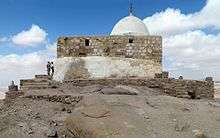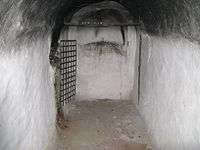Tomb of Aaron
The Tomb of Aaron is the name of the supposed burial place of Aaron, the brother of Moses. There are two descriptions of its location in the Pentateuch, and different interpretations of its location. Although in Jewish tradition, the location of Aaron's grave, like that of Moses, is shrouded in mystery, the Islamic tradition places it on Mount Hor, near Petra in Jordan.


Location
The Pentateuch gives two accounts of Aaron's death. The Book of Numbers (Chapter 20)[1] gives a detailed statement to the effect that, soon after the incident at Meribah (Kadesh), when Moses and Aaron showed impatience by bringing water out of a rock to quench the thirst of the people after God commanded them to speak to the rock, Aaron, his son Eleazar, and Moses ascended Mount Hor, on the edge of the borders of Edom. There, Moses stripped Aaron of his priestly garments and gave them to Eleazar. Aaron died and was buried on the summit of the mountain, and the people mourned for him thirty days.[2][3]
Mount Hor is usually associated with the mountain near Petra in Jordan, known in Arabic as Jabal Hārūn (Aaron's Mountain), upon the summit of which a mosque was built in the 14th century.[4][5] Indeed, Josephus and Eusebius both describe its location above the city of Petra.
The other account is found in the Book of Deuteronomy, where Moses is reported as saying that Aaron died at Moseroth (Mosera) and was buried there.[6] Mosera has been identified with el-Tayibeh, a small fountain at the bottom of the pass leading to the ascent of Mount Hor. However others are of the opinion that the location of Mosera cannot be here, since the itinerary in Numbers 33:31-37[7] records seven stages between Mosera and Mount Hor.[8] For similar reasons, others still doubt that Mount Hor can in reality be identified with Jabal Hārūn.[9]
The site at Jabal Hārūn (Aaron's Mountain) is occasionally visited by Jewish pilgrims as well as Muslims.[10]
Religious status
Jordanian authorities regard the Tomb of Aaron as a mosque and forbid Jewish prayer services at the site. In August 2019, a group of Israeli tourists shared a video of themselves dancing with a Torah scroll at the site. Authorities then confiscated religious items from the group and closed the summit to foreign tour groups that do not have permission to visit from the Awqaf Ministry.[11]
References
- "Numbers 20".
- KJV
- KJV
- "Aaron's Tomb, Petra". Atlas Travel and Tourist Agency. Retrieved 2008-07-12.
- "Tomb of Aaron". United States Naval Academy. Retrieved 2008-07-12.
- Deuteronomy 10:6
- KJV
- McCurdy, Frederic; Kaufmann Kohler. Aaron. Retrieved 2008-07-12.
- Levi, Gerson. Aaron's Tomb. Retrieved 2008-07-12.
- "Jordanian police threaten to jail Israeli pilgrims for praying". Times of Israel. Retrieved 2017-07-24.
- Joffre, Tzvi (5 August 2019). "Jordan Closes Aaron's Tomb After Jews Seen Praying at Site". Jerusalem Post.